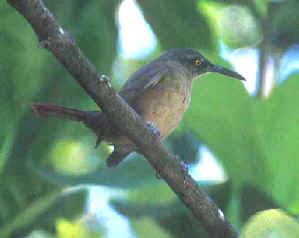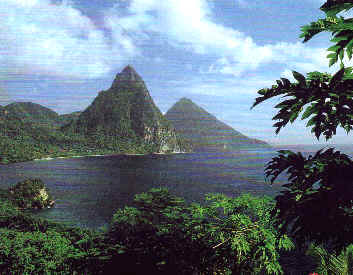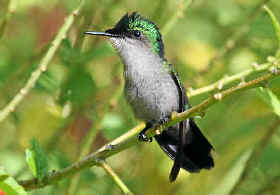
E-mail: font@focusonnature.com
Phone: Toll-free in USA 1-888-721-3555
or 302/529-1876
 |
PO
Box 9021, Wilmington, DE 19809, USA E-mail: font@focusonnature.com Phone: Toll-free in USA 1-888-721-3555 or 302/529-1876 |
A Focus On Nature Tour in
The LESSER
ANTILLES
on the beautiful
Caribbean islands of
SAINT LUCIA, SAINT VINCENT
and DOMINICA
(tour: FON/WI-1 '16)
February
13-21, 2016
For
Endemic & Specialty Birds
During our previous tours
on these islands we've seen:
On St. Lucia:
On St.
Vincent: the endemics, including the St. Vincent
Parrot
and the Whistling Warbler. Specialties too.
On Dominica: the
endemic & rare Imperial
& Red-necked Parrots,
and some fine specialties such as:
Plumbeous Warbler, Blue-headed Hummingbird, & Forest Thrush.
Throughout: seabirds, including tropicbirds
& others.
A Tour where Thrashers
thrash
and Tremblers tremble,
with 6 members of the Thrasher family.

Brown Trembler on Dominica
Links:
Birds & Some Other Nature of the Lesser Antilles
A
List & Photo Gallery of Caribbean Birds, in 2 parts:
Part #1: Guineafowl to Hummingbirds
Part #2: Trogons to Buntings
Rare Birds of the Caribbean, Past & Present
Butterflies of the Caribbean (with some photos)
Mammals of the Caribbean (Land & Marine)
Marine Life of the Caribbean (including Sea Turtles, Fish, Corals, Jellyfish, Mollusks, Arthropods)
Amphibians & Reptiles of the Caribbean (with some
photos)
Previous
Lesser Antilles Tour Highlights
Itinerary (prices follow):
Sat, Feb 13 Arrival in St. Lucia (at the Vigie Airport, near Castries). The first of our four overnights in pleasant, comfortable accommodations that will serve as our "home base" at the north end of the island near Castries.

The Lesser Antillean
Island of St. Lucia
Sun-Mon, Feb
14-15
On the truly
beautiful Caribbean island of St. Lucia,
we'll see some quite special birds. All
of them have been seen during our previous 14 tours on the island.
The St. Lucia Parrot
and the White-breasted Thrasher are the rarest.
The newly-split Gray
Trembler one of the most interesting. Endemic to St. Lucia, it's one of 5
species in the thrasher-group occurring on this one island.
Other endemics
include an oriole and a finch.
Very attractive hummingbirds
occur including 2 species of caribs.
The rare "Saint Lucia
Wren" (a form of the House Wren) has been seen during our tours.
We'll visit a superb
forest reserve in the hills (the place for the parrot), as well as a nice lagoon for
waders (where rarities such as Little Egret have occurred),
and a coastal
cliff where Red-billed Tropicbirds and some tropical pelagic species,
such as boobies and 4 species of terns, can be seen.
Tue, Feb 16
A
flight, in the morning, from St. Lucia to the island of St.
Vincent, the southernmost island we'll
visit.
Birding on this island will be interesting as well, with species such as
the St. Vincent Parrot, St. Vincent Solitaire, Whistling Warbler, and Lesser Antillean Tanager.
Our
first overnight on St. Vincent.
Wed, Feb 17
Birding and travel on St. Vincent,
with visits to the various habitats in order to
find the specialty birds. We'll visit the forest in the hills with the parrots,
and the Montreal Gardens, which can be a wonderful place for the birds that
favor fruits and flowers. The hummingbirds on the island (2 species of
Caribs
and the Antillean Crested) are in that category. Another overnight on St. Vincent.

A female Antillean Crested
Hummingbird
photographed during a previous
FONT tour in the Lesser Antilles
Thu, Feb 18
A flight from St. Vincent to the island of Dominica, the
last island we'll visit, and one of the most beautiful of all the Caribbean
islands. It's a green island, with considerable forest cover. We'll be spending
parts of 4 days and 3 nights on the island. Our birding on Dominica will begin as
soon as we arrive on the island.
Fri, Feb
19
A
full-day on Dominica, not just a green
island, but one with spectacular peaks, ridges, and ravines. About half of the small island is over 1,000 feet
above sea level. As noted, there's forest. About three-fourths of the island is covered by
forest - the
most that still exists in the West Indies. Much of the forest is lush, either
categorized as "rain" or "cloud" forest.
In the forests pf Dominica, some special
birds are to be found.
Among them: the rare Forest Thrush,
the localized
Plumbeous Warbler,
the Rufous-throated Solitaire (with its beautiful song),
and
2 species of endemic parrots.
Dominica is the only island in the
Caribbean where 2 species of Amazons occur: the Red-necked and the Imperial - the latter, the largest of the
parrots in the
Caribbean. Overnight on Dominica.
Sat, Feb 20
Another day of birding
on Dominica. We'll take a boat-trip offshore, along the western coast of the island. Birds
in that area, that we've seen during our previous tours, have included, White-tailed
Tropicbird, 2 species of boobies, a rather large number
of Pomarine Jaegers, and even Great Skua.
On the water, and
below, there could be some interesting marine mammals, such as Great Sperm
Whales and Dwarf Sperm Whales, Humpback Whales, the rarely-seen Fraser's
Dolphin, and other dolphins. All of these we've seen during our previous
trips.
Sun, Feb 21
Departure from Dominica for home.
![]()
Price:
US$ 2,395 per person based upon double-occupancy.
Single-supplement: US$ 315
Includes:
All
accommodations.
Meals: breakfasts & lunches (except those on Feb 13 & 21, and
except dinners throughout).
Ground transportation on the various islands.
Services of the guides.
Permits for entries to national forest land and restricted areas.
Does not include:
Meals on Feb 13 & 21.
Dinners.
Drinks & any other items of a personal nature.
Gratuities.
Air transportation to/from and between the islands.
(That cost for the Caribbean flights
estimated to be about $US 285.)
Note: International flights to be into St. Lucia to begin the tour, and after
the tour from Dominica.
Tour to be led by Armas
Hill.
A deposit of US
$500 is required to reserve a place on the tour.
![]()